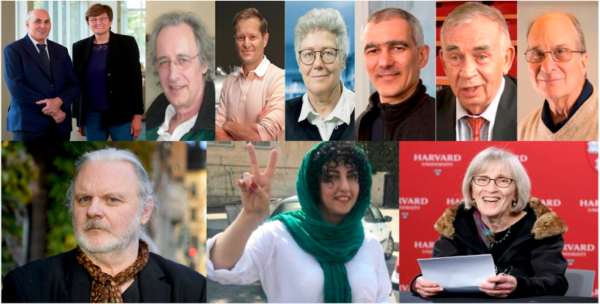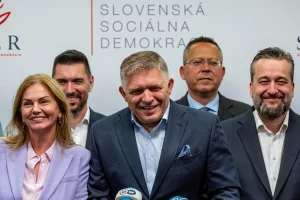Over the course of the past two weeks, as is customary for the beginning of October, the five Nobel Prizes and the Sveriges Riksbank Prize have been awarded to individuals and groups that have made outstanding contributions in their relative fields – Physiology or Medicine, Physics, Chemistry, Literature, Peace, and Economic Sciences. Since the conception of the five Nobel Prizes at the beginning of the twentieth century, with the Sveriges Riksbank Prize following in 1968, 975 individuals and 25 organizations have received honors. Additionally, five people and two organizations have the distinguished status of being multiple-time recipients. All laureates receive an 18-karat gold medal, a diploma containing a citation, and a monetary prize of 11,000,000 Swedish krona (roughly €950,000).

Nobel Prize in Physiology or Medicine
On Monday, 2 October, the 2023 Nobel Prize in Physiology or Medicine was jointly awarded to biochemists Katalin Karakó and Drew Weissman, the former Hungarian and the latter American. The two newly-anointed Nobel Laureates were recognized at the Karolinska Institute in Solna, Sweden, for their “discoveries concerning nucleoside base modifications that enabled the development of effective mRNA vaccines against COVID-19”. Karakó and Weismann have been researching RNA-based therapeutics for decades, becoming acquainted with one another at the University of Pennsylvania in the late 1990s and working in conjunction ever since. Their work was finally recognized internationally following the spread of the pandemic and subsequent prevention efforts
Nobel Prize in Physics
On Tuesday, 3 October, the 2023 Nobel Prize in Physics was awarded to trio Pierre Agostini of Ohio State University in Columbus, Ohio, Ferencz Krausz of Max Planck Institute of Quantum Optics in Munich, Germany, and Anne L’Huillier of Lund University in Sweden. The three physicists – French, Hungarian-Austrian, and French, respectively – were acknowledged for their experiments “that generate attosecond pulses of light for the study of electron dynamics in matter”, which are highly significant in the field of physics as it creates new avenues for the exploration of the complex world of electrons. To put an attosecond into scale, one second contains roughly as many attoseconds as the number of seconds that have elapsed since the creation of the universe. The initial discovery was made by L’Huillier in 1987 when she and her colleagues were able to generate high-frequency light as a product of the interaction between atoms and infrared laser beams. This breakthrough was employed by Agostini and Krausz, who exhibited separately that these interactions could be used to create attosecond pulses, which in turn could be observed, measured, and used in future experiments.
Nobel Prize in Chemistry
On Wednesday, October 4th, the 2023 Nobel Prize in Chemistry was awarded to three scientists “for the discovery and synthesis of quantum dots”. The three researchers recognized were American-Tunisian-French chemist Moungi G. Bawendi, of the Massachusetts Institute of Technology (MIT), American Louis E. Brus of Columbia University, in New York, and Russian Alexei I. Ekimov of Nanocrystals Technology Inc, also in New York. The quantum dot phenomenon has been studied by Ekimov since the 1970s, and his initial discoveries were expanded upon by Bawendi and Brus in the years since; the former was responsible for “revolution[izing] the production of quantum dots”, and the latter was credited with shedding light on the patterns and properties of the nanoparticles. Quantum dots, which are already being used in the production of certain TVs, monitors, solar cells, and medical imagery equipment, add a unique layer to the previous understanding of particles, especially due to their unique properties, patterns, and applications.
Nobel Prize in Literature
On Thursday, 5 October, the 2023 Nobel Prize in Literature was awarded to the Norwegian author Jon Fosse “for his innovative plays and prose which give voice to the unsayable”. Fosse’s work, often described as ‘post-dramatic’, has been widely acclaimed for its complex existentialism, continuing down the stylistic path laid by two former Nobel Laureates, Samuel Beckett (1969) and Harold Pinter (2005). His pieces, such as Melancholy II and the Septology collection – widely acknowledged as Fosse’s “magnum opus” – are recognizable for their compressed and unorganized nature, with stream-of-consciousness writing prominent throughout. Over his career, Fosse has completed an extensive catalog of an unknown number of works, including poems, plays, novels, essays, and children’s books, which have been translated into roughly fifty languages.
Nobel Peace Prize
On Friday, 6 October, the 2023 Nobel Peace Prize was awarded to Iranian activist Narges Mohammadi, recognizing “her fight against the oppression of women in Iran and her fight to promote human rights and freedom for all”. Mohammadi is still imprisoned at the time of writing, and throughout her time as an activist, the Iranian regime has punished her with 13 arrests, five convictions, and a total prison sentence of 31 years and 154 lashes. She has been commended by organizations and leaders worldwide, including Amnesty International, who have praised her “tireless” work in bringing attention “to the dire human rights situation in Iran”, as well as U.S President Joe Biden, who called Mohammadi an “inspiration to people everywhere who are fighting for human rights and basic human dignity”.
Sveriges Riksbank Prize
Finally, on Monday, 9 October, the 2023 Sveriges Riksbank Prize in Economic Sciences in Memory of Alfred Nobel was awarded to American economist Claudia Goldin, of Harvard University, “for having advanced our understanding of women’s labour market outcomes”. Goldin, who became only the third woman to receive the distinguished prize, has worked on labor economics since receiving her PhD from the University of Chicago in 1972. Since then, Goldin – who thinks of herself as a “detective,” believing that there is always a way to find an answer – has published numerous papers, such as “The Quiet Revolution” and “The Gender Pay Gap” (both 2006). Being honored with this prize has meant “a tremendous amount” to Goldin, who has said that she “could never be” where she is today without her students.
Overall, it was a relatively successful year for female laureates, who shared or won outright four of the six prizes up for grabs, representing 36% of the total winners, the highest proportion since 2009 (38%). While the organization and its decisions have not been immune to controversy and criticism, the Nobel Prizes provide an exceptional annual snapshot of where we are as a civilization, particularly in terms of technological or scientific advances, as well as the latest developments in social sciences and diplomacy.
Read the Full Press Releases Below:
2023 Nobel Prize – Physiology or Medicine
2023 Sveriges Riksbank Prize in Economic Sciences in Memory of Alfred Nobel






